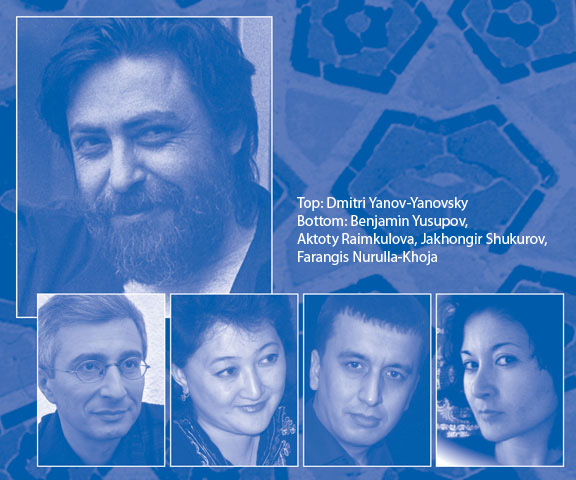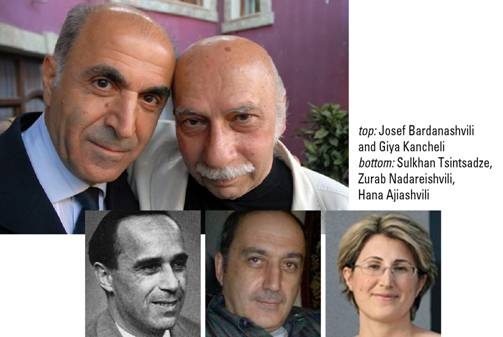Continuum’s “Music at the Crossroads” concert featured composers of Central Asia, and the program successfully combined ancient traditions with modern ones. Continuum’s exploration of rarely-heard music is sometimes a result of its travels to remote parts of the globe. In this case, the ensemble has toured several times to Central Asia, most particularly to Uzbekistan, but also to Kazakhstan and Tajikistan. The strong musical traditions and the creativity of composers there obviously made an impact on the talented group of directors and performers that form Continuum.
The concert featured Dmitri Yanov-Yanovsky, who is from Uzbekistan. Yanov-Yanovsky has worked tirelessly on behalf of his country’s cultural life as professor of composition and founder/director of the Ilkhom Festival, an innovative annual international event. Highly regarded in Europe and the former Soviet Union, he recently spent two years at Harvard University on a special fellowship invitation and currently is teaching in the Chicago area. Continuum programmed three of his works: “Chang-Music IV” (1991), a work for string quartet which emulates the Central Asian cimbalom; “A-S-C-H” (Hommage to Alfred Schnittke for ensemble – 2004); and “Five Limericks by Edward Lear” (2005) for mezzo-soprano and piano trio. Each work and every musician captivated the audience at hand. Another fascinating work from Uzbekistan, “Music for Chamber Ensemble” (2004) was composed by Yanov-Yanovsky’s former student Jakhongir Shukurov; this was a smart addition to the program.
Throughout the evening, the music hinted at its unique ethnicity, but also pointed to the region’s ancient music. The Kazakh composer Aktoty Raimkulova’s “Alatau”, for ensemble (2011), and written specifically for this concert, reflects her country’s folk music. The title refers to the majestic mountains hovering over her city, Almaty. Continuum brought the usual spark and polish to the performance. The country of Tajikistan, while currently desperately poor and underdeveloped after a long civil war, has a rich musical heritage. Central Asian influences were heard in the works of Tajikistan-born Farangis Nurulla-Khoja: “Blind Flower” for mezzo-soprano and ensemble (2008), and Benjamin Yusupov’s “Haqqoni,” both written for and premiered previously by Continuum. Nurulla-Khoja now lives in Montreal, and Yusupov immigrated to Israel during Tajikistan’s civil war. “Haqqoni” combines a live ensemble with vintage recordings of ritualistic chanting—plus singing from his family’s Bukharian tradition.
All the performers were excellent: Rachel Calloway, mezzo-soprano; Tanya Dusevic Witek, flute; Moran Katz, clarinet; Renée Jolles and Airi Yoshioka, violins; Eva Gerard, viola; Claire Bryant and Chris Gross on cello; Jared Soldiviero, percussion; Cheryl Seltzer, piano and Joel Sachs, conductor. Continuum has chosen just the right music and performers for a memorable—and thought-provoking occasion.



![Mamlok_-_fotographer_Simon_Pauly_MÀrz_09_011_sm[1]](https://www.nyconcertreview.com/blog/wp-content/uploads/blog_images/Mamlok_-_fotographer_Simon_Pauly_MÀrz_09_011_sm1.jpg)
 In the first concert of its 44th New York season, Continuum did one of the things it does best: explore important, talented composers who are relatively unknown in this country. Music of Canada was presented in a program entitled “Northern Exposures: Canadian Music—The New Individualists.” I came away from this program thinking that Canadian composers are indeed unique and tend to go their separate ways.
In the first concert of its 44th New York season, Continuum did one of the things it does best: explore important, talented composers who are relatively unknown in this country. Music of Canada was presented in a program entitled “Northern Exposures: Canadian Music—The New Individualists.” I came away from this program thinking that Canadian composers are indeed unique and tend to go their separate ways.